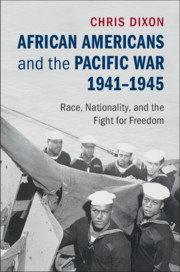Refine search
Actions for selected content:
15418 results in Military history
Bibliography
-
- Book:
- African Americans and the Pacific War, 1941–1945
- Published online:
- 10 September 2018
- Print publication:
- 20 September 2018, pp 261-276
-
- Chapter
- Export citation
Chapter 3 - A Sexualized South Seas?
-
- Book:
- African Americans and the Pacific War, 1941–1945
- Published online:
- 10 September 2018
- Print publication:
- 20 September 2018, pp 95-135
-
- Chapter
- Export citation
Copyright page
-
- Book:
- African Americans and the Pacific War, 1941–1945
- Published online:
- 10 September 2018
- Print publication:
- 20 September 2018, pp iv-iv
-
- Chapter
- Export citation
Acknowledgments
-
- Book:
- African Americans and the Pacific War, 1941–1945
- Published online:
- 10 September 2018
- Print publication:
- 20 September 2018, pp xi-xiv
-
- Chapter
- Export citation
Contents
-
- Book:
- African Americans and the Pacific War, 1941–1945
- Published online:
- 10 September 2018
- Print publication:
- 20 September 2018, pp vii-viii
-
- Chapter
- Export citation
Chapter 5 - Behaving Like Men
-
- Book:
- African Americans and the Pacific War, 1941–1945
- Published online:
- 10 September 2018
- Print publication:
- 20 September 2018, pp 176-218
-
- Chapter
- Export citation

African Americans and the Pacific War, 1941–1945
- Race, Nationality, and the Fight for Freedom
-
- Published online:
- 10 September 2018
- Print publication:
- 20 September 2018
2 - The Structure of Discipline and the Spectre of Indiscipline
-
- Book:
- Morale and Discipline in the Royal Navy during the First World War
- Published online:
- 17 August 2018
- Print publication:
- 30 August 2018, pp 53-91
-
- Chapter
- Export citation
Dedication
-
- Book:
- War Stuff
- Published online:
- 16 August 2018
- Print publication:
- 30 August 2018, pp v-vi
-
- Chapter
- Export citation
Dedication
-
- Book:
- Morale and Discipline in the Royal Navy during the First World War
- Published online:
- 17 August 2018
- Print publication:
- 30 August 2018, pp v-vi
-
- Chapter
- Export citation
7 - 1865 and After
-
- Book:
- War Stuff
- Published online:
- 16 August 2018
- Print publication:
- 30 August 2018, pp 155-172
-
- Chapter
- Export citation
Works Cited
-
- Book:
- War Stuff
- Published online:
- 16 August 2018
- Print publication:
- 30 August 2018, pp 211-246
-
- Chapter
- Export citation
3 - ‘Addressing’ Pay and Conditions
-
- Book:
- Morale and Discipline in the Royal Navy during the First World War
- Published online:
- 17 August 2018
- Print publication:
- 30 August 2018, pp 92-148
-
- Chapter
- Export citation
1 - Ethos on the Eve of War: The Foundations of Paternalism and Democratism
-
- Book:
- Morale and Discipline in the Royal Navy during the First World War
- Published online:
- 17 August 2018
- Print publication:
- 30 August 2018, pp 20-52
-
- Chapter
- Export citation
Notes
-
- Book:
- War Stuff
- Published online:
- 16 August 2018
- Print publication:
- 30 August 2018, pp 173-210
-
- Chapter
- Export citation
Index
-
- Book:
- Morale and Discipline in the Royal Navy during the First World War
- Published online:
- 17 August 2018
- Print publication:
- 30 August 2018, pp 261-266
-
- Chapter
- Export citation
6 - Breakdown
-
- Book:
- War Stuff
- Published online:
- 16 August 2018
- Print publication:
- 30 August 2018, pp 131-154
-
- Chapter
- Export citation
Abbreviations
-
- Book:
- War Stuff
- Published online:
- 16 August 2018
- Print publication:
- 30 August 2018, pp xi-xii
-
- Chapter
- Export citation
3 - Sustenance
-
- Book:
- War Stuff
- Published online:
- 16 August 2018
- Print publication:
- 30 August 2018, pp 54-81
-
- Chapter
- Export citation
Contents
-
- Book:
- War Stuff
- Published online:
- 16 August 2018
- Print publication:
- 30 August 2018, pp vii-vii
-
- Chapter
- Export citation
